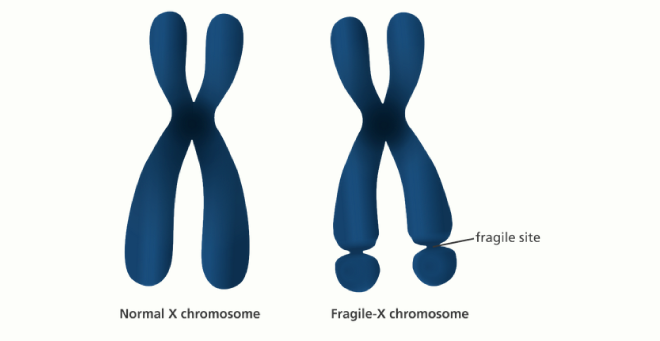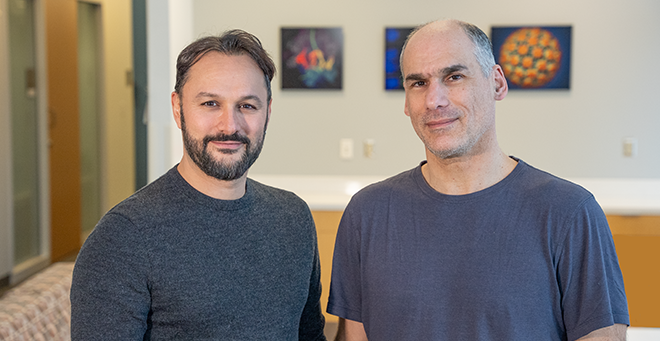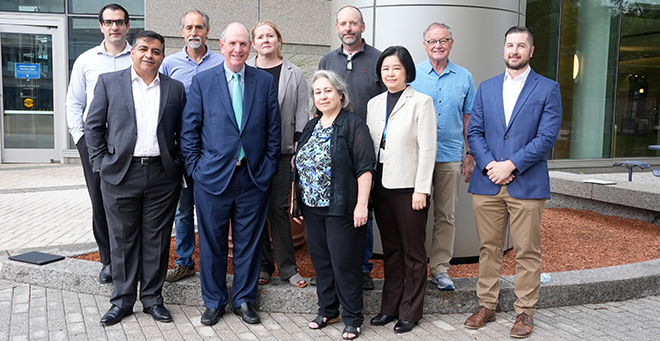Bridge Innovation and Business Development at UMass Chan Medical School invested nearly $2 million in 13 faculty-led research projects that hold promise for translation to clinical application and commercialization.
The BRIDGE Fund supports critical research milestones for inventions and discoveries that have high potential to change the course of disease. The funding will mitigate investment risk by producing key data sets that would provide an attractive entry-point for partners and investors. This investment fund continues to grow, increasing from approximately $1 million per year in 2019 to $3 million in 2024.
“We’re proud to invest $2 million in pioneering projects that showcase potential for clinical application and commercialization. Over the past three years, we have invested more than $6 million to build a strong pipeline of cutting-edge inventions across new therapeutics and medical devices,” said Parth Chakrabarti, MBA, executive vice chancellor for innovation and business development.
“For years, we have had great success working with investors to develop new siRNA and gene therapies for hard-to-treat diseases. This year, we are making investments to diversify our pipeline across other areas such as oncology, immunology, ophthalmology and infectious diseases, among others,” said Chakrabarti.
UMass Chan faculty submitted 29 projects for consideration this year. Project finalists presented to an external advisory board comprising biomedical industry leaders, investors and venture capitalists. The advisory board and BRIDGE selected awardees based on shared criteria. The criteria included scientific merit, innovation, unmet need, market readiness, value proposition and proposed milestones. Funding for the first round of milestones ranged from $31,000 to $302,400.
“I’m truly impressed by the caliber of research and scientific breakthroughs supported by the BRIDGE Fund. The innovative projects chosen hold immense promise for advancing biotech and medicine. I’m excited to see the progress of the research and the positive impact they will have on our industry and society,” said Christalyn Rhodes, PhD, external advisory board member and associate vice president of genetic medicine, external partnerships and collaborations at Eli Lilly and Company.
As part of the venture model approach, project funding will be linked to milestone achievements. Developmental milestones have clear objectives and detailed criteria for advancement before receiving additional funding and proceeding to successive milestones. BRIDGE will work closely with faculty over the next year to track progress.
BRIDGE will begin accepting applications for the new fiscal year in September. Projects will be selected, and funding awarded by June 30, 2024.
2023 BRIDGE Fund awardees
- John Harris, MD, PhD, chair and professor of dermatology, and director of the Vitiligo Clinic and Research Center: Self-delivering AIM2-siRNA as adjuvant therapy to treat nonresponders to melanoma immunotherapy.
- Erik Sontheimer, PhD, the Pillar Chair in Biomedical Research and professor of RNA therapeutics: A novel precision genome editing platform.
- Craig Ceol, PhD, assistant professor of molecular medicine: Development and validation of human antibodies that target BMP signaling in melanoma.
- Phillip Tai, PhD, assistant professor of microbiology & physiological systems: Grafting of an enhanced VP1u region derived from natural AAV2 capsids onto other capsid serotypes to boost transduction of adeno-associated virus vectors for gene therapy.
- Fiachra Humphries, PhD, assistant professor of medicine: Therapeutic targeting of a macrophage receptor in cancer.
- Claudio Punzo, PhD, associate professor of ophthalmology & visual sciences: Pre-investigative new drug studies for the treatment of age-related macular degeneration.
- Trudy Morrison, PhD, professor of microbiology & physiological systems: Efficacy of a novel VLP vaccine for respiratory syncytial virus.
- Andrei Korostelev, PhD, professor of RNA therapeutics: mRNA-specific readthrough of nonsense codons to treat hundreds of genetic disorders.
- Kevin Donahue, MD, professor of medicine: High-intensity and atrial-specific gene expression for treatment of atrial fibrillation
- Ann Marshak-Rothstein, PhD, professor of medicine: Development of a second generation sFasL gene therapy for glaucoma.
- Dohoon Kim, PhD, associate professor of molecular, cell & cancer biology: Detoxifying enzyme inhibition as a targeted, predictable therapy for refractory lung cancer and beyond.
- Paul Thompson, PhD, professor of biochemistry & molecular biotechnology and director of the Chemical Biology Interface program: Inhibitors of the SARS-CoV2 main protease for the treatment of SARS-CoV2
- Celia Schiffer, PhD, the Arthur F. and Helen P. Koskinas Professor of Biochemistry and Molecular Biotechnology and chair and professor of biochemistry & molecular biotechnology: Dual-acting HIV-1/HTLV-1 protease inhibitors.


